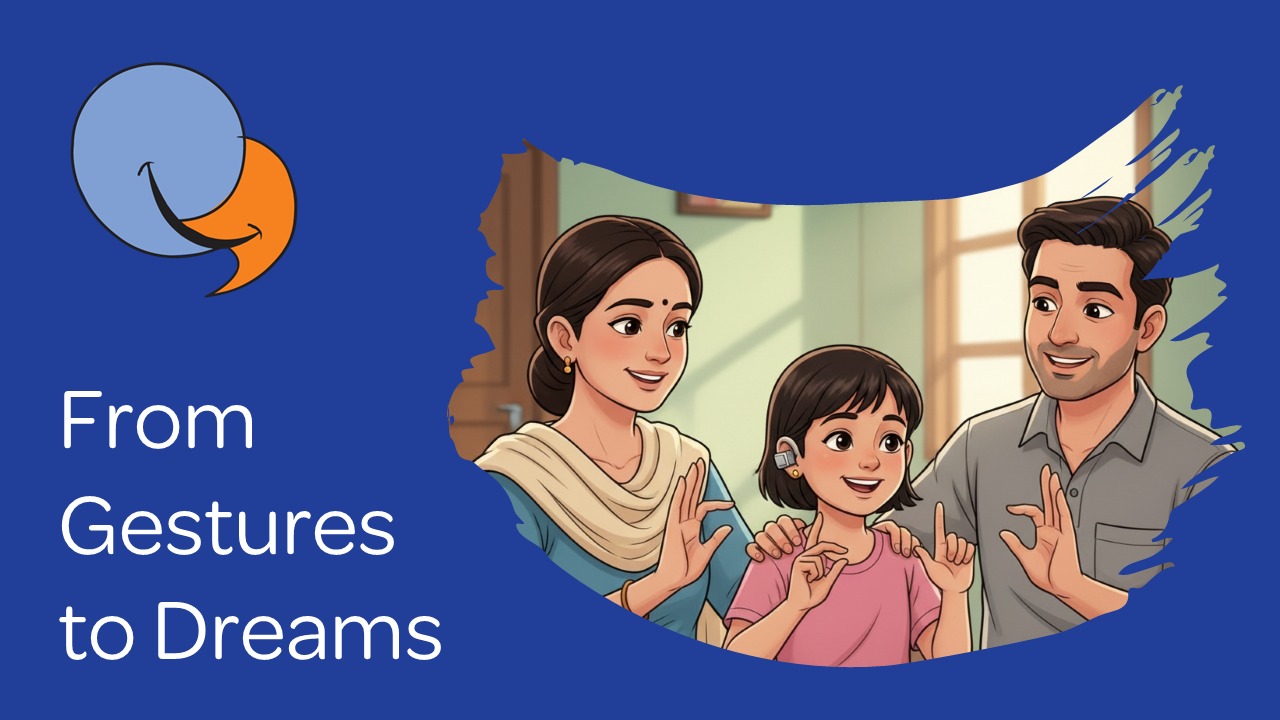A mother’s hand, a father’s strength: Gitartha’s story
When Binapani first watched her little boy scribble answers that did not match the strange, incomplete sounds he made, she felt a knot of worry tighten in her chest. Gitartha was three, and where other children in Khutikotia played with words, he held them back. A diagnosis in Guwahati and later in Chennai named what the family already feared: bilateral severe to profound hearing loss.
His father, Benudhar, stood steady through the long commutes, hospital visits, and decisions about schooling. Though worried, he worked quietly in the background to hold the family together, while his wife sought new ways to reach their son.
At VAANI, both mother and son began learning Indian Sign Language. Together they discovered that what had looked like silence was, in truth, a crowd of unmet meanings waiting for the right doorway.
“At VAANI, both Gitartha and I learned to use sign language, and that brought clarity to what he wrote and thought. I never realized how deeply hearing loss could impact speech and learning. VAANI became our guide — teaching me everything from the nature of deafness to how to truly support my son,” says Binapani.
In April 2025, Gitartha passed his Class X board exams with First Division. He now studies Class XI, loves javelin and art, and dreams of computers. For his father and mother alike, that result is more than marks: it is the confirmation that a child’s mind is never less than whole; it only needs the right keys to open.
When gestures turned to dreams: Arjuara’s journey
In Goroimari, 21-year-old Arjuara grew up relying on gestures and lip-reading after rejecting her hearing aids. Her father, Islam Uddin, and her mother, Lalvanu Nessa, tried every avenue available — moving her between schools, standing by her when progress seemed uncertain.
Their persistence was rewarded when a VAANI camp introduced them to a new path. Registered at the Outreach Centre in 2020, the family found patient teachers who showed them that education could be accessible.
“The teachers continuously helped by explaining and simplifying complex concepts, which benefitted Arjuara immensely. I am deeply thankful for all the support she has received,” her mother recalls.
That support carried Arjuara to a First Division in her Class X exams in 2025. Today she studies science and dreams of joining the medical field — a dream her father supports with quiet determination.
A family’s leap of faith: Abhijit’s move to Guwahati
For Abhijit Das, now 17, the turning point came when his parents made a difficult decision: to leave their home in Dudnoi and move to Guwahati so he could have access to a school and resources. His father, Dhiren, shouldered the responsibility of relocating the family, while his mother, Rita, sought the skills to communicate with her son.
“I did not know how to communicate properly with my son. VAANI helped us learn how to understand each other. That connection allowed me to support him in his early learning, and gradually, he developed an interest in studying. Today, seeing him pass his 10th exams feels like a dream come true,” Rita shares.
Abhijit now studies in Class XI and dreams of a career in technology. His father’s sacrifice and his mother’s persistence remind us that progress is always built on shared strength.
The quiet strength of fathers, the fierce advocacy by mothers
Across Kolkata and Assam, mothers often became the visible anchors — attending workshops, sitting through remedial classes, interpreting for teachers. But the fathers’ roles were no less vital. They worked long hours, often in modest jobs, creating stability so that their children could attend schools or travel to VAANI centres.
Shuvam’s father, Lalon Rajwar, earns about ₹7,000 a month as a garage mechanic. His wife, Purnima, recalls: “The progress of our son has been remarkable. Whatever he has learned — especially in maths — is because of the support from VAANI. I’m deeply thankful to the teachers and the entire team. VAANI didn’t just help my child; it helped me grow into a better, stronger parent.” Lalon’s steady income, though small, sustained the family’s hope while his wife carried their son’s educational journey.
For Imran, his father Abdul Quddus and mother Naznee felt helpless at first, but later expressed their gratitude together: “We are overjoyed that our son has passed his 10th Board exams. We are immensely thankful to VAANI and the entire team for their unwavering support.”
In family after family — from Rejoyan’s parents in Basirhat to Muskan’s father Khalil in Kolkata — the picture is the same: mothers stepping into the role of teachers, interpreters and motivators, and fathers providing the backbone of stability, sometimes unseen, but always crucial.
Communication as dignity
These voices tell us something clear: when sign language is respected, taught, and resourced, children learn, parents connect, and families stay whole. When it is denied, children are left behind, even when their minds and hearts are brimming with possibility.
As Muskan’s mother puts it: “In the beginning, Muskan knew only a few words. But with time, guidance, and regular home practice, I could see her change and grow. I always stayed in touch with VAANI’s teachers whenever I had doubts.”
And from Isha’s teacher Soma, the transformation is visible: “She used to be afraid of math, but we gave her specific strategies and cue words. With time, she began improving steadily.”
Beyond silence, toward rights
Communication is not just about words. It is about being seen, understood, and loved. For these families, Indian Sign Language turned silence into connection, and connection into success.
These stories remind us that sign language rights are not abstract. They are the right to childhood, the right to learning, and the right to dream.



